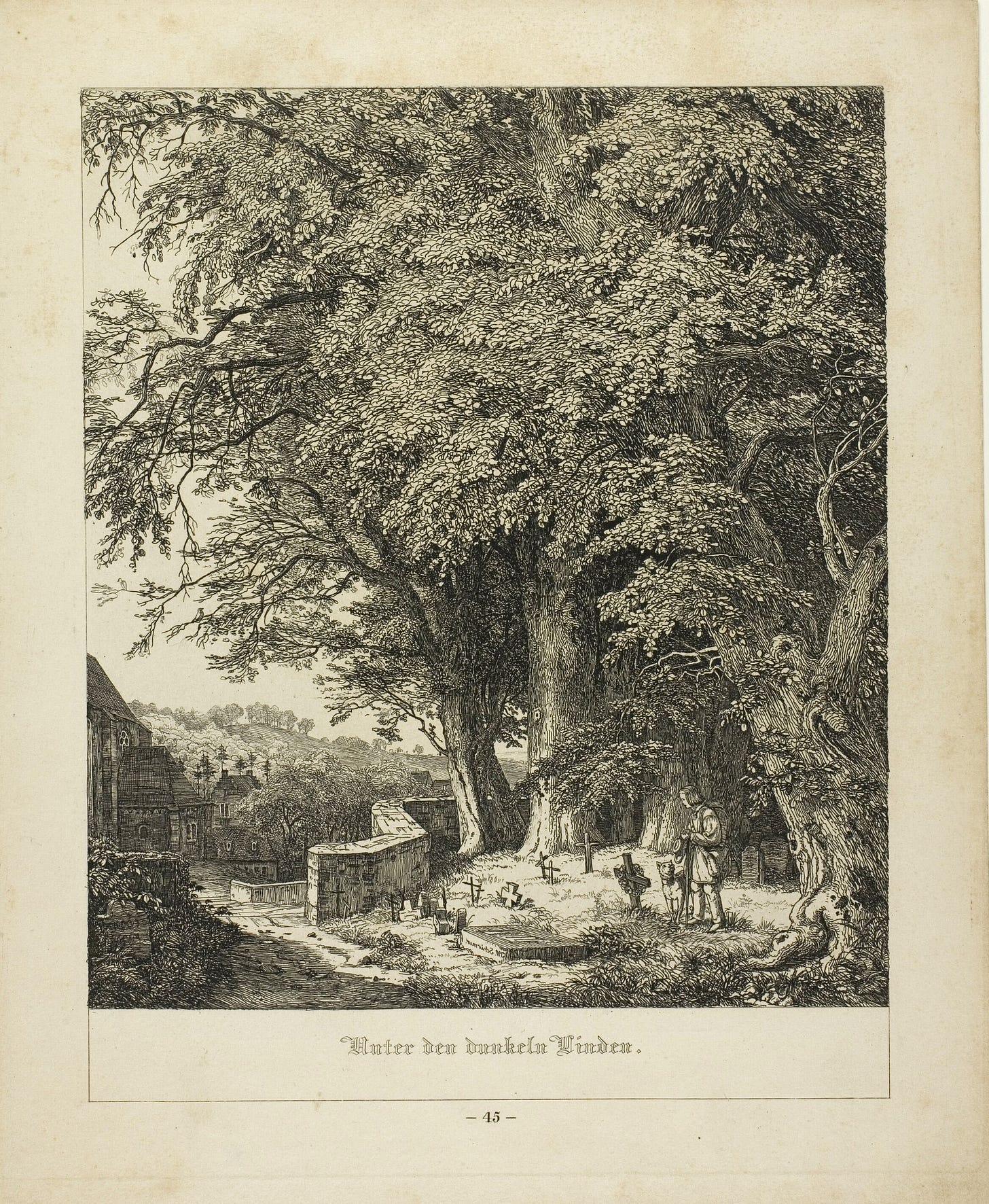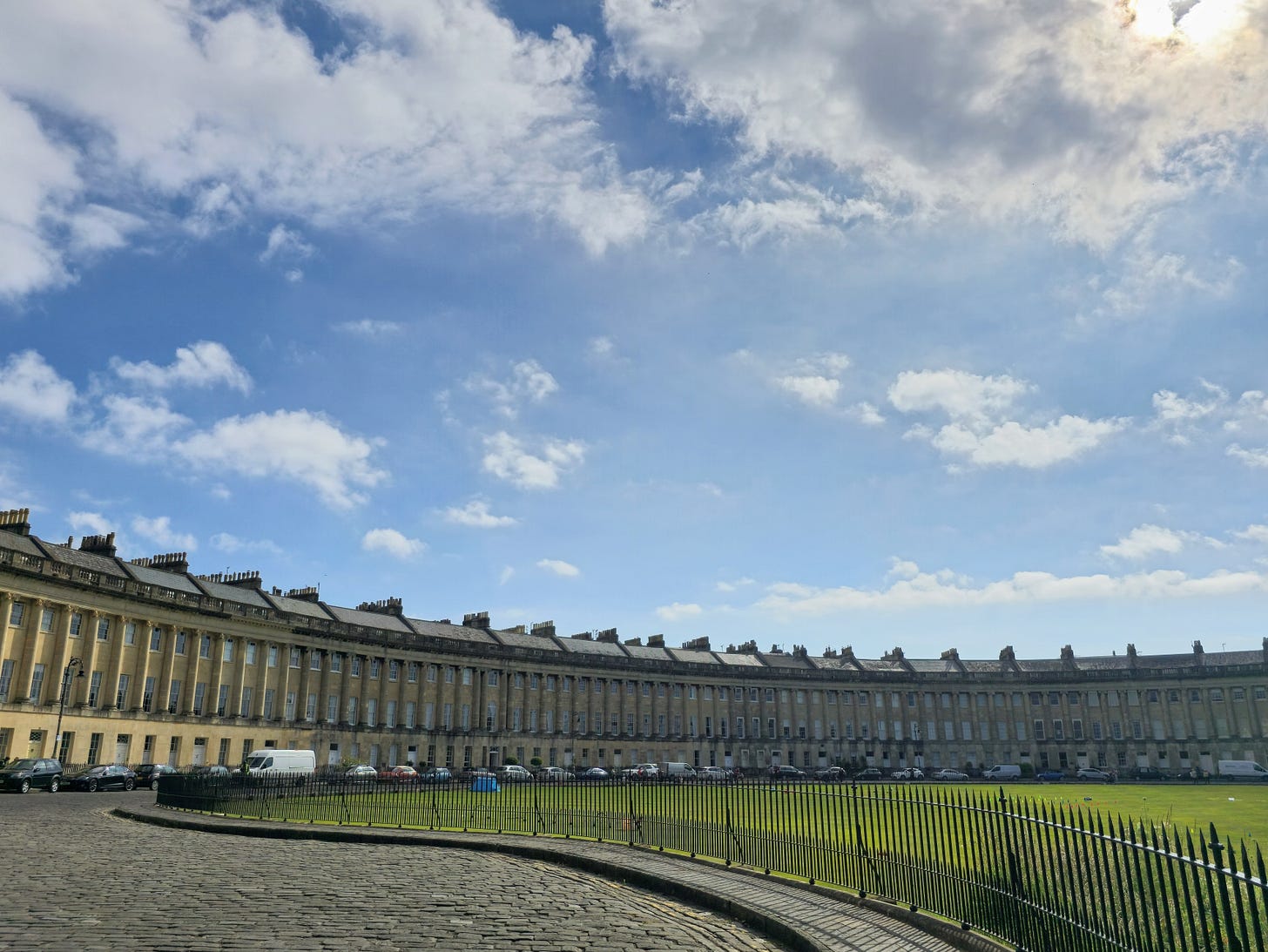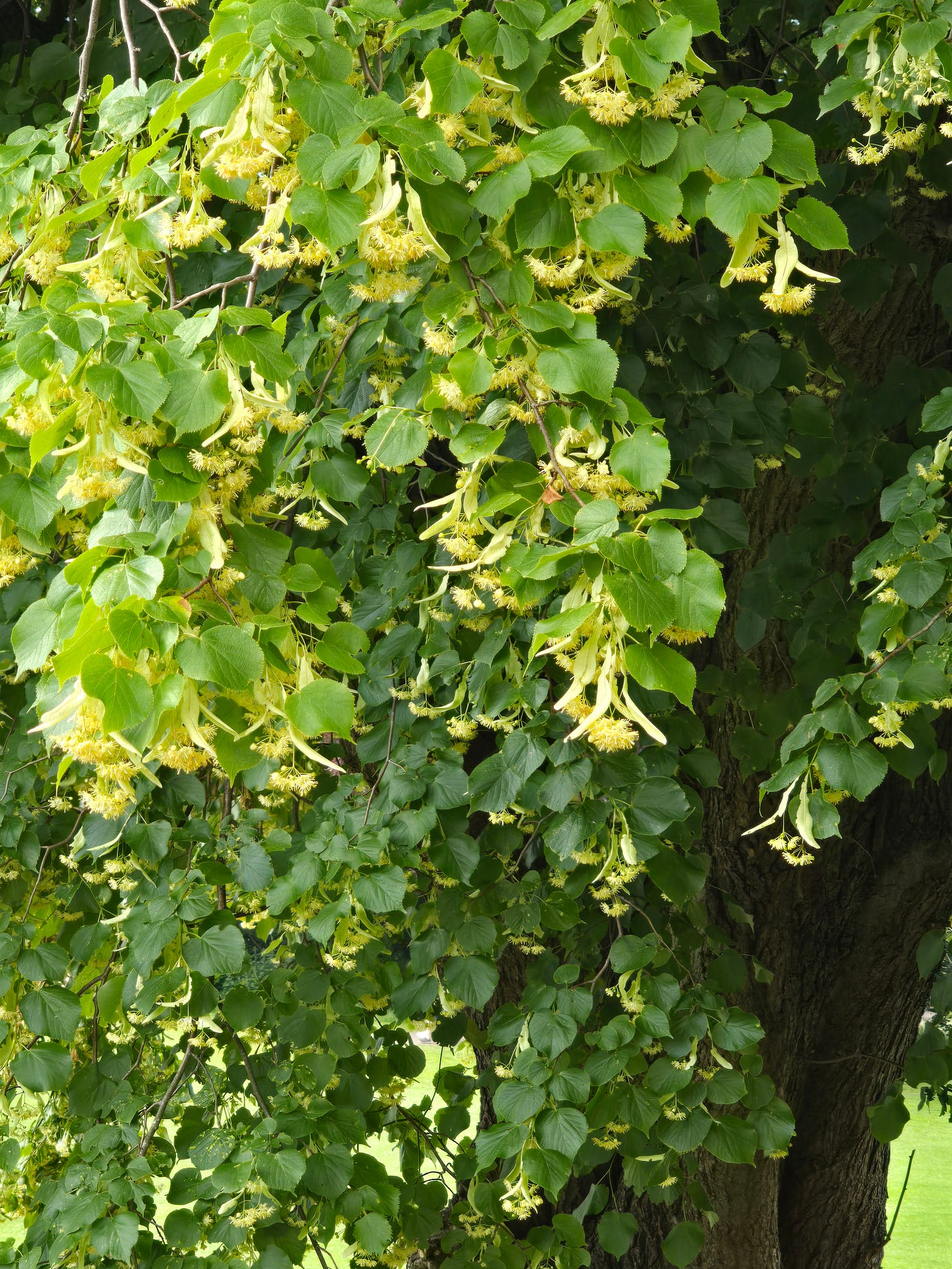
O God, I could be bounded in a nutshell and count myself a king of infinite space, were it not that I have bad dreams"
Hamlet, Act 2, Scene 2
"Well," said Pooh, "what I like best," and then he had to stop and think. Because although Eating Honey was a very good thing to do, there was a moment just before you began to eat it which was better than when you were, but he didn't know what it was called.
From Winnie-the-Pooh by AA Milne
🌳🌳🌳
Back in England on holiday this summer, I made my way uphill from the centre of the city of Bath to visit the famous Royal Crescent. It was an unusually warm day for England. I could feel the sweat beginning to form on my forehead.
Arriving at my destination, I admired the curve of the buildings and took the usual photos. But what really captured my attention in the gathering heat were some trees just to one side of the street. Their beautiful foliage glowed in the morning sun and I could hear the sound of bees at work between the fragrant flowers. They were lime trees, also known as linden trees (of the genus Tilia), and I hadn’t seen one for years.
As I admired the sound, the scent, and the glow of the foliage of the lime tree, my taste buds took me back to the flavour-laden French linden honey (“miel de tilleul”) I’d eaten in Tokyo during the winter. It was a powerful connection.
But then an even stronger association floated into my head.
🐝🐝🐝
This Lime-Tree Bower My Prison is one of my favourites of Samuel Taylor Coleridge’s poems. In it, he is sitting under a lime tree and describes how:
Pale beneath the blaze
Hung the transparent foliage; and I watch'd
Some broad and sunny leaf, and lov'd to see
The shadow of the leaf and stem above
Dappling its sunshine!
Coleridge wrote the poem in a village called Nether Stowey, in Somerset, in the summer of 1797, about 50 miles south-west of Bath. It addresses a group of friends who left on a walking tour without him, as he’d suffered a domestic accident and couldn’t join them.1
The poet imagines his friends as they
On springy heath, along the hill-top edge,
Wander in gladness,
And he conjures up the views of the coast there, which are close to my heart:
The many-steepled tract magnificent
Of hilly fields and meadows, and the sea,
With some fair bark, perhaps, whose sails light up
The slip of smooth clear blue betwixt two Isles
Of purple shadow!
To me, it reads like a magnificent hymn to summer—by which I mean to the green, mild, and moderate English summer I remember from my childhood in the West Country of England. I lived about an hour’s drive from Nether Stowey.
This hymn comes complete with a reference to bees, symbols both of happy industry and lazy summer days in the garden:
though now the bat
Wheels silent by, and not a swallow twitters,
Yet still the solitary humble-bee
Sings in the bean-flower!
The poet dramatises a moment of apparent "captivity." But soon Coleridge admits to having become captivated by his surroundings while he travels in his mind to where his friends are, thereby escaping his “prison:”
A delight
Comes sudden on my heart.
Under the surface, the poem seems to play with the common roots of the words captivate and captivity. Captivate still retains heavy traces of its former meaning, "seize by force.”
Despite the poem’s title, the true captive here, one might argue, was the addressee of the poem, Charles Lamb. Lamb was a well-known essayist and co-author with his sister Mary of Tales from Shakespeare (1807), a book that’s never been out of print in the two centuries since its publication. He was also a friend of Coleridge and Wordsworth.
At the moment captured in Coleridge’s poem, Lamb was only on a temporary reprieve—a holiday, like mine—from his deskbound drudgery in London:
My gentle-hearted Charles! for thou hast pined
And hunger'd after Nature, many a year,
In the great City pent2
🌳🌳🌳
Lamb had already spent 5 years in the East India Company and it would be another 28 before he escaped his life as a clerk, despite his skills and accomplishments as a writer.
At the East India Company, Lamb worked six days a week for 33 years as a clerk, where apparently he “sat at a high sloping desk on a tall stool, enclosed in a kind of cage with his colleagues.”3
I can understand something about Lamb's 33-year period of employment because I spent 34 years working for one employer. It’s a peculiar feeling—a mixture of resentment at the “captivity” blended with the pride that one feels about putting in a long shift of continuous service.4
🐦⬛🐦⬛🐦⬛
Going back to Coleridge’s glorious hymn to summer, I found it interesting to compare it with another poem with a lime tree in the title, one by Wilhelm Müller and used as a text for Schubert’s beautiful song, Der Lindenbaum, “The Lime Tree.” 5
In Müller’s poem, the poet seems glad to leave the tree forever, as he says with apparent relief:
Now I am many hours
Away from that spot
Somehow, in the vaguely expressed drama of this poem, the lime tree feels more like a prison than it ever was for Coleridge.
The speaker in Der Lindenbaum has abandoned the tree—or escaped it—but it still calls to him, eerily rustling non-existent leaves in the depths of winter. It’s altogether a much darker poem, inhabiting a cold climate, while the force exerted on the speaker by the lime tree seems almost malign and certainly unwelcome.
But in the Coleridge poem, the leaves are real and airy rather than eerie and we see how nature, in the form of a bird, benignly stands as an image for human travellers, and we move calmly towards the beautiful lines where he evokes the moment
When the last rook
Beat its straight path along the dusky air
Homewards.
Home is benevolent; it’s being with family or friends; it's a place of comfort. A refuge, not a prison. A journey ends in a homecoming, not an exile, as in the Müller poem.
The rook’s straight path is not an escape. It’s part of an elliptical, crescent-shaped series of departures and returns.
Coleridge’s evocations of the journey home in the figure of the rook make me think of the countless trips I have taken back and forth between London and the West Country, the West Country, and the world. Home could have been any of the three. Or all of them. Or none.
The bees have their hive and the rooks their rookery. Humans are perhaps freer to define home for themselves. For Coleridge, home was not the place where he found himself on that summer evening, but a place of imagination, accompanying his friends and his fancy wherever they roamed.
🍯🍯🍯
My holidays are over for now. And though this may not be the end of my journeying, I feel that I have found my own refuge here in Tokyo, my own lime-tree bower, a place, to quote Coleridge for the last time, “to keep the heart awake.”
And I’ve even discovered that this winter I’ll be able to enjoy linden honey from Nagano Prefecture, not far from the Japanese Alps, with no need to get it imported from France. I’m sure the local bees are busy making it as I write.
So now at last, perhaps, I can echo the words written almost two hundred years ago by Charles Lamb in a letter to William Wordsworth after his last day at the office of the East India Company:
“I came home forever!”6
🐦⬛🐦⬛🐦⬛
He told a friend that his wife, Sara Fricker, had accidentally spilled boiling milk on his foot.
Lamb wrote more than once to Coleridge after the poem was published, remonstrating with the poet for branding him as “gentle-hearted Charles.”
Quoted in the London Review of Books. For a look at the history of the East India Company and its role in colonising many territories, see the excellent post by
here. The company’s rapacious, imperialistic activities suggest another layer of meaning: The captivated "prisoner,” Coleridge, was writing to the encaged Lamb, whose employer was “captivating” great tracts of India and other countries. And there is yet another layer of incarceration to consider: the writer Mary Lamb, Charles’ sister, was periodically confined to a local mental health facility during her lifetime. In September 1796, she’d killed their mother in a fit of madness. She and Charles lived together until the latter’s death in 1834.Der Lindenbaum, D 911/5. There’s a lovely performance here.
https://www.gutenberg.org/cache/epub/10125/pg10125-images.html





The layers of engagement in your footnote about the East India Company ... wow. (Thank you for including the link to my piece on it! There are so many lessons to learn about the entwinement of corporate and state power.)
And I was recently listening to something about Kafka, whom I often forget worked in insurance for much of his life, and wrote in after hours.
Another of those splendid "gentle-souled" :), perambulatory and elliptical essays you write with such accomplishment, Jeffrey. And more Larkin!